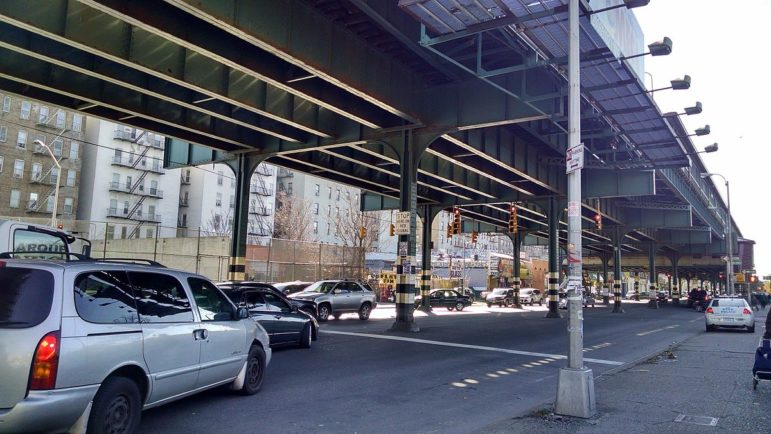
The All-Nite Images
The de Blasio administration is studying the area along Jerome Avenue from 167th Street to 184th for a rezoning.
Heeding Bronx stakeholders’ calls for more community input into the rezoning of Jerome Avenue, the Department of City Planning (DCP) has postponed the release of the draft scope from May until September.
“We’ve learned that we don’t want to rush out these things,” said Purnima Kapur, the executive director of the DCP, at a panel discussion hosted by the Fifth Avenue Committee last week. “We are truly taking our time in Jerome to make sure we can engage more with the community.”
As part of its plan to build or preserve 200,000 units of affordable housing, the city has proposed a neighborhood revitalization effort that would transform Jerome Avenue, currently zoned for manufacturing and auto-uses, into a mid- to high-density residential corridor with new housing and commercial spaces, along with a few areas in which zoning is maintained to preserve industrial or auto-use.
A coalition of neighborhood groups called the Coalition for Community Vision, however, has released its own comprehensive plan, which included a variety of strategies to protect residents and businesses from displacement and create good jobs.
Kapur described the Coalition for Community Vision’s comprehensive plan as useful—both because it helps inform the city what community members want, and because it has brought many new stakeholders into the discussion. She said that going forward, however, the city would seek further discussion with community members about the tradeoffs they might need to choose from: for instance, between the number of affordable units and the depth of affordability.
“Our role is really going to the community and being honest and open about the options,” Kapur said, and she highlighted the agency’s new effort to document all their neighborhood commitments on a website. “Everything we are promising in the plan, we are holding ourselves responsible.”
Carmen Vega-Rivera, a Community Action for Safe Apartments leader and a steering committee member of the Coalition, says she believes the postponement is the result of the Coalition’s many meetings with elected officials over the past few months and a letter sent in April, published in City Limits, outlining how the city should conduct its environmental review and incorporate the Coalition’s vision into its plan.
“Moving the scope will give us more time to make our case, to make our push,” she says. “I’m very hopeful that they will be incorporating these principles and demands. Otherwise you’re going to be really destroying a community.”
Some of those demands include deep affordability in the housing created as a result of the rezoning, stricter labor standards for workers involved in the new development and the formation of a community entity to hold the city accountable to its promises. The coalition also wants to see the citywide adoption of provisions that would require landlords to obtain a certificate of no harassment before completing demolition or renovation work and the passage of legislation providing universal free legal services to low-income tenants in housing court.
Councilmember Vanessa Gibson said she requested that the city postpone the rezoning so she would have more time to engage residents and community organizations over the summer. In an effort to broaden outreach to groups that may not have been included in the discussion, she intends to hold a series of roundtables to determine new strategies for the plan, especially concerning health care, parkland, public transit, education, social services, small businesses and commercial diversity. The outcome of this engagement, she hopes, will further enhance the scope that emerges in September.
“It’s important for me to really engage the residents and have an opportunity to have their concerns heard,” she says. “I believe that buying myself time means an opportunity to capitalize on the work that we’re doing.”
Gibson says she supports many of the Coalition’s proposals, including its call to maximize the amount of housing for families making below 30 percent of area median income (AMI), who make up 42 percent of the rezoning area’s two community districts. She added, however, that she also believes there should be units for families making 40 percent and 50 percent AMI to allow income diversity (the Coalition does not oppose that). Like the Coalition, she is calling for an in-depth environmental impact statement, especially in light of the polluting highways and industries and poor health outcomes in her district .
“I want them to do more than minimum. I want them to do more than they [did] in East New York,” she says.
Councilmember Fernando Cabrera, who represents the northern part of the rezoning area, also voiced his support for the city’s delay.
“I believe that the Jerome Avenue rezoning project will be an important part of efforts to revitalize our neighborhood, but I stand with my colleague Councilmember Gibson in applauding the city for postponing the scoping for the project at this time,” said Cabrera in an e-mail to City Limits. “While I hope to see the project move ahead in a timely manner, we cannot get started without considering the perspectives of community members and housing advocates. Allowing a diversity of voices to weigh in on development projects is critical to create the unity we need to build a thriving, inclusive community.”
City Limits’ coverage of housing policy is supported by the Charles H. Revson Foundation, and our reporting on the Bronx is supported by the New York Community Trust.
***








